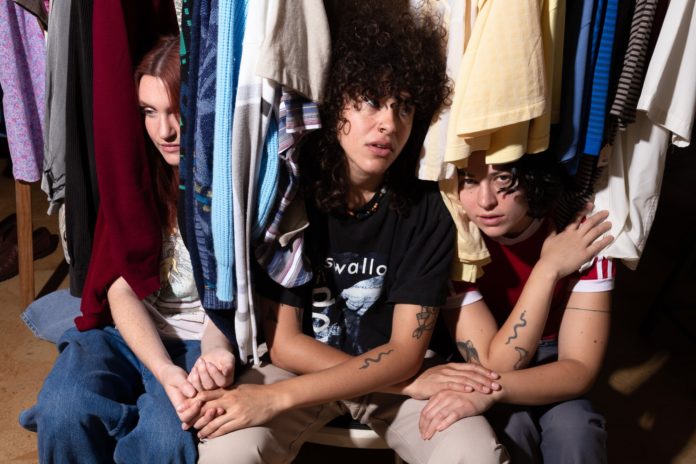Ask any music or fashion aficionado: Between low-rise jeans, thundering nü-metal bass lines and the renaissance of Britney Spears, Y2K nostalgia is taking off.
Yet not all Y2K throwbacks need reviving, say the members of Los Angeles indie-pop trio Muna. Between the ubiquity of rape jokes in popular movies and TV, not to mention the unceremonious outings of then-closeted celebrities like Lindsay Lohan and Lance Bass of ‘N Sync, “we were being sold back this [harmful] idea of ourselves,” says Katie Gavin, 29, lead vocalist of Muna.
Released on June 24 on indie-rock star Phoebe Bridgers’ record label, Saddest Factory, the band’s self-titled third album is an exquisite act of musical justice for those who suffered the indignities of growing up queer in the Y2K era.
Comprising Gavin, lead guitarist Josette Maskin, 28, and multi-instrumentalist Naomi McPherson, 29, the group mines the cultural touchstones that inspired its members’ own queer awakenings — from the bombastic romanticism of teen idols like the Backstreet Boys to the country-pop sparkle of Shania Twain — and cultivates an inclusive pop future.

Getting dropped by their major label “helped [us] figure out our own path and forge a way for ourselves,” says Muna’s Katie Gavin.
(Emily Monforte / For The Times)
The trio, who first became acquainted at USC, didn’t intend for the band to be a vehicle for queer liberation. Yet they seemed to coalesce around one thing that wasn’t music: “It was definitely the gay [factor],” says Maskin. “It’s the one thing we all have in common.”
“There was a deeper journey we were meant to go on,” says Gavin.
Gavin, who grew up singing along to country songs in the suburbs of Chicago, and Maskin, a native Angeleno who came up in the punk rock scene, studied at the USC Thornton School of Music. McPherson arrived to USC from San Diego to major in American and ethnicity studies.
A classically trained pianist and guitarist, McPherson, whose pronouns are they and them, initially resisted music as a career path. Now, they lead the production of every Muna release. “I grew up thinking I had to do classical or traditional music,” says McPherson. “I didn’t know what Ableton was until Katie showed me how to make beats. I started making chopped-and-screwed remixes of songs, like Slim K and DJ Screw. I fell in love with producing.”
By 2016, Muna — a play on “luna,” the Spanish word for moon — landed a major label record deal with RCA, going on to release two albums for the label: 2017’s “About U” and 2019’s “Saves the World.” The band would soon embark on tours with Harry Styles and Kacey Musgraves. Yet communication began to break down between Gavin and McPherson, who had been dating for two years before the band was signed. Maskin urged them to try therapy, even joining in at times, in service of the band’s survival — not to mention their friendship.
“We broke up shortly after we signed,” says McPherson of their relationship with Gavin. “Me and Katie, we’re both Capricorns. We’re headstrong, we have this intense work ethic. But whatever we didn’t see eye to eye on was just not as important as the music or our friendship.”
Intra-band romantic turmoil wasn’t the only obstacle Muna had to overcome: In spring of 2020, amid the pandemic, RCA released Muna from their contract.
The silver lining, says Gavin, is that “it helped [us] figure out our own path and forge a way for ourselves.”
In true Muna fashion, friendship would eventually save the day. The band had been in contact with Bridgers, who saw them perform an acoustic set in L.A.’s Bootleg Theater. In 2021, she signed them to Saddest Factory.
“Their songwriting [and] lyrics are bulletproof,” Bridgers told The Times in March.
Muna playfully refers to Bridgers as “Big Papa” — “Big Papa in essence, little papa in actuality,” says Maskin, referring to both Bridgers’ charisma and stature. Together with Bridgers, they recorded what would become their standout hit, a sanguine guitar-pop single titled “Silk Chiffon.” The lyrics were the brainchild of Gavin, who workshopped the song with Musgraves collaborators Ian Fitchuk and Daniel Tashian in Nashville.

From left, Naomi McPherson, Katie Gavin, and Josette Maskin of Muna perform onstage at the 2022 SXSW in Austin.
(Chris Saucedo / Getty Images)
An appreciation of love between women, the song is a work of Americana-pop reverie, anchored firmly by a drum machine and verses so supple they catch the breeze. “Watch her silk dress dancing in the wind / Watch it brush against her skin,” sings Gavin, “Makes me wanna try her on.”
In making the video, “Silk Chiffon” director Ally Pankiw took inspiration from the campy 1999 rom-com “…But I’m a Cheerleader,” which takes place in a Christian conversion center for gay teens. In the music video, Gavin plays the titular cheerleader who is smitten with a girl in the program; meanwhile, Bridgers plays the pink-haired schoolmarm in charge, while popular gay comedian Caleb Hearon plays a conflicted gay coach.
“The movie was released the same year as ‘American Pie,’” says Pankiw, citing the raunchy teen sex romp starring Jason Biggs. “‘American Pie,’ which was [steeped] in rape culture, got an R rating. ‘Cheerleader’ was rated NC-17 because it included a queer love story. Whose lives might have been drastically changed had they seen [‘Cheerleader’] before ‘American Pie’?”
“It was a conservative time,” says McPherson of the 2000s. “The media was so much more homophobic and misogynistic. Someone like Lindsay Lohan being in an openly queer relationship [with Samantha Ronson] back then meant the world to me. The purpose of being this band lies in [trying to be] for other people what we did not have. How amazing would it have been to not feel like [being queer] had to be a secret?”

Naomi McPherson.
(Emily Monforte / For The Times)

Katie Gavin, left, and Josette Maskin.
(Emily Monforte / For The Times)
The group has played a role in integrating queer pop culture into American pop culture at large, alongside the advent of TV juggernaut “RuPaul’s Drag Race” and a growing number of out LGBTQ musicians, actors and lawmakers no longer compelled to hide who they love. After appearing on soundtracks for queer films like “The Carmilla Movie” and Netflix’s 2018 offering “Alex Strangelove,” Muna was tapped to contribute to the soundtrack for Hulu’s buzzy gay rom-com, “Fire Island,” for which they recorded a clubby spin on Spears’ 1999 ballad “Sometimes.”
For the record:
12:07 p.m. July 22, 2022An earlier version of this article quoted Naomi McPherson as saying, “We’re not romanticizing that time, we’re rewriting it for a new generation.” That quote was spoken by the reporter.
“I think it is a therapeutic exercise, like healing your inner child,” continues McPherson.
And yet, as the demand for LGBTQ media grows, so do its adversaries: According to the ACLU, state legislators across the U.S. have introduced a record 162 bills seeking to limit or eliminate LGBTQ rights.
In the tradition of the many queer artists who came before, Muna looks to pop and dance music as its locus for resistance. “We owe that tradition to trans [people] of color,” says Gavin, in reference to disco legend Sylvester and the New York ballroom community that famously captivated Madonna.
“Our album was literally released on the day that Roe v. Wade was overturned,” says Gavin. “We live in a major city [where] we’re very lucky to feel safe and affirmed. But in touring this country and other countries, we interface with people for whom that is not their lived experience. In some spaces, being out and being ourselves is contentious. We have an obligation to put that in our music.”

(Emily Monforte / For The Times)








